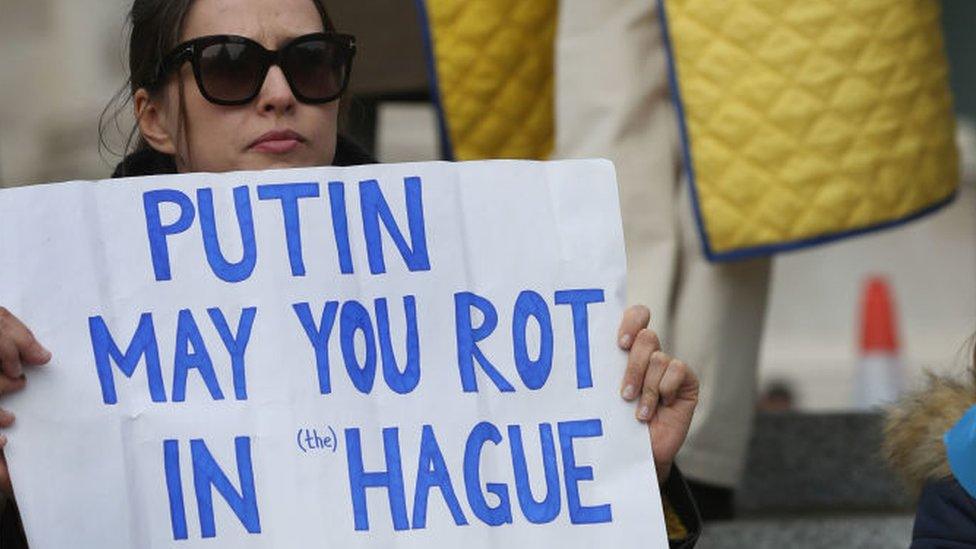No impunity for Russia over Ukraine, ICC says
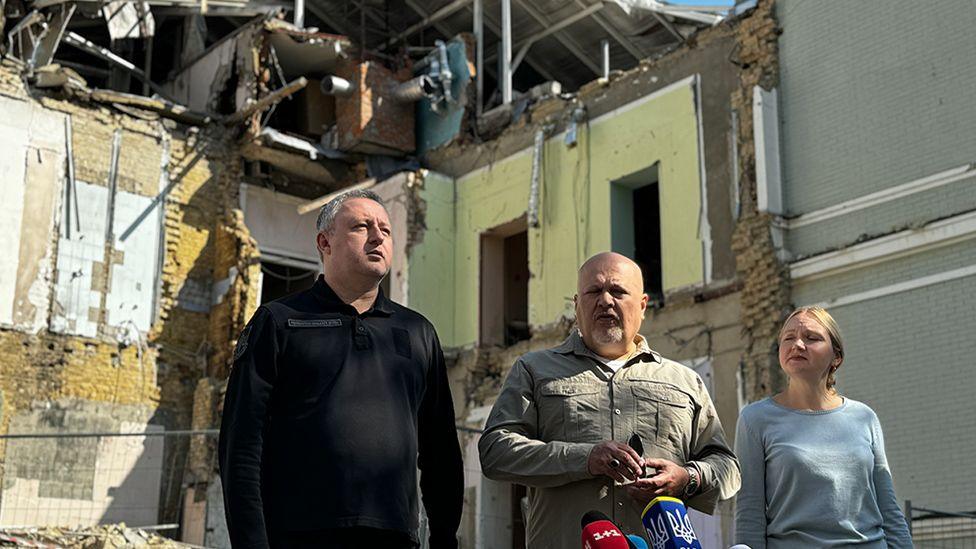
ICC Chief Prosecutor Karim Khan and Ukraine’s Prosecutor General Andriy Kostin
- Published
The chief prosecutor of the International Criminal Court (ICC) has said his team are doing all they can to deliver justice for crimes committed by Russia during its war in Ukraine.
Karim Khan was speaking on a visit to Ohmatdyt, Ukraine’s largest children's hospital in Kyiv, which was hit by a missile in July killing two adults and a young boy.
Mr Khan, who is the first British prosecutor of the ICC, told the BBC: "We're here for a purpose. It's not a sightseeing visit. It's to move forward... to make sure we pierce the veil of impunity and make sure the law is felt."
Mr Khan met doctors and patients outside Ohmatdyt's shattered intensive care unit and was shown fragments of what Ukrainian investigators said was a Russian Kh-101 cruise missile.
Russia has claimed the blast was caused by a misfiring Ukrainian air defence missile, but the United Nations said it was “highly likely” Moscow was indeed behind the attack.
I put it to Mr Khan that if he thought the Russian account was credible he would not have come to the hospital, which was the first leg of this trip.
Mr Khan said he had a "duty to investigate incriminating and exonerating evidence" and that his team was examining the remnants of the missile, which bear serial numbers.
The strike on the Ohmatdyt Children's Hospital came during a wave of Russian missile and drone attacks across the country which Ukrainian officials said killed at least 46 people - including 33 in Kyiv - and injured nearly 200.
Around 1200 patients and staff were in the hospital complex at the time of the attack.
Among them was 16-year-old Solomia Fomeniuk, who was receiving kidney dialysis for the chronic renal failure she has suffered from since birth.
Footage from the day of the attack showed her mum, Oksana, desperately calling out for her amid the smoking rubble, before they were later reunited.
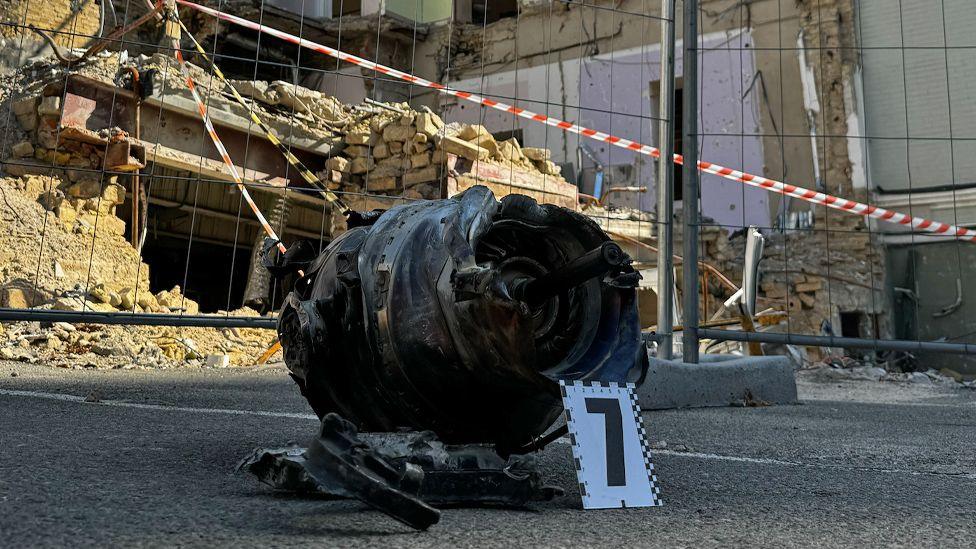
A fragment of a missile outside Ohmatdyt Children's Hospital
Solomia is now being treated in the western city of Lviv, 470km (290 miles) from Kyiv, because her specialist unit was one of those destroyed.
On a video call, she told us she remembers fear being her overriding emotion that morning.
“It was very scary, but I tried not to listen to the explosions and kept calm. But when the rocket hit, I didn't immediately understand what had happened.”
Then came the realisation that the hospital had suffered an attack. She said she remembered a doctor, covered in blood, pulling her and another young patient from the rubble.
Solomia's mum, Oksana, said it was a miracle they had both survived the strike, and said the attack had "a heavy impact on our lives, even tragic. It is difficult to live after this.”
At the hospital, Mr Khan was given a private briefing by Ukraine’s Prosecutor General, Andriy Kostin, who is in charge of the court prosecution system in the country and has previously called on the ICC to investigate the hospital attack as a war crime.
The presentation was held in the car park of the hospital and showed information about the type of missile used, fragments of which were laid out and numbered.
The hospital’s director previously told the UN Security Council that the strike severely damaged several departments, including the intensive care units and oncology and surgical wings, and completely destroyed the toxicology and traumatology departments.
Mr Kostin told the BBC that every effort was being made to eventually bring prosecutions at the ICC.
“Ukrainians live in a very difficult time... every day between hope and belief for the better future," he said.
"But on the accountability and justice track, I think that we can give belief, we can provide belief because justice will be served," Mr Kostin added.
"And it's not only about arrest warrants already issued. We understand that at some stage, we will need people behind the bars in The Hague.”
In March 2023 the ICC issued an arrest warrant for Russian President Vladimir Putin, and more warrants were put out earlier this year for Russia's former defence minister, Sergei Shoigu, and the chief of general staff, Valery Gerasimov.
Mr Kostin added that every legal avenue would be pursued. "There is no statute of limitations for the time," he said. "We understand that our work is for years, maybe for decades, but our commitment is to do it as soon as it is possible.”
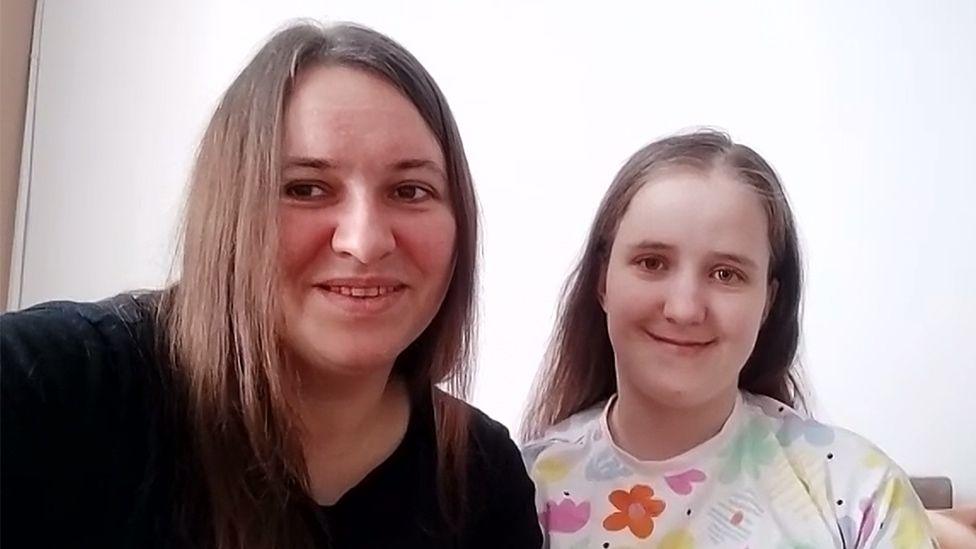
Oksana and her daughter Solomia
Meanwhile, Solomia is looking for a kidney donor. If one is found, she could stop dialysis and her life would be immeasurably improved. A transplant would hopefully allow her to drink more than one glass of water a day, which she said is very little, particularly in the summer.
When we asked her mum what she thought of the ICC investigating the attack on the hospital, she was sceptical anything would happen.
“I think that this will not lead to anything, to any positive result,” Oksana said. “The ICC finds Putin guilty - and what next? There are international organisations in the world that could prevent all this happening in Ukraine. But no one has done anything so far.”
Later, during Mr Khan’s visit, we asked him what his message would be to Oksana.
He acknowleged that while his team's work would not "bring the dead back to life," they were doing their best.
"If everybody plays their part, hopefully it can mitigate some of the harrowing stories that we're hearing around the world and also here in Ukraine.”
Additional reporting by Charlotte Scarr, Hanna Tsyba and Volodymyr Lozhko
Related topics
- Published8 July 2024
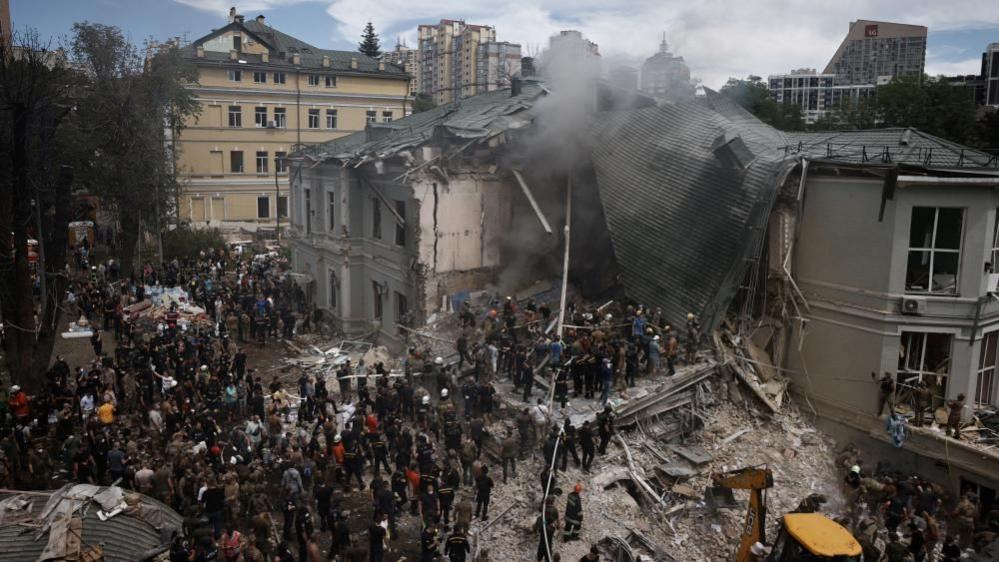
- Published17 March 2023
